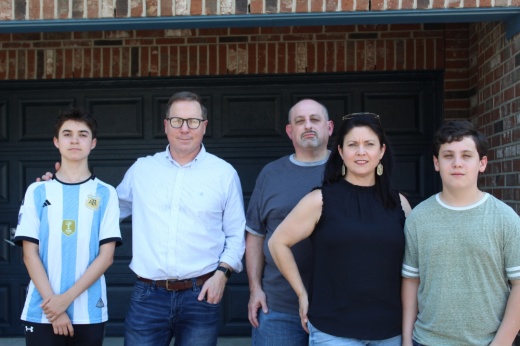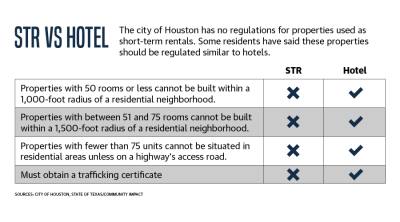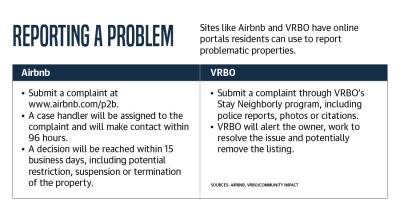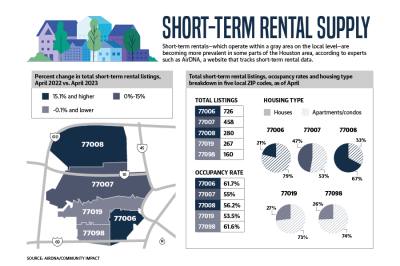Short-term rental properties, or STRs, found on platforms such as Airbnb, are in a legal gray area; they are unregulated by local law in the city of Houston, raising concerns among some residents.
Jason Ginsburg is a Montrose resident who lives near the proposed site of Bria Place, the first STR property being developed by former football player Darryl Sharpton through his hospitality brand, The Sharpton.
Ginsburg argues that larger STRs adjacent to residential properties go against a city ordinance on hotels which states that hotels with 50 rooms or less cannot abut a residential property on any side. Residents such as Ginsburg who have spoken with Community Impact want the city to update its code to incorporate STRs and are frustrated with what they said is a lack of action so far.
“Our group’s position is that all short-term rentals that adjoin residential properties in the city of Houston—which I feel like would be the vast majority of them—should not be allowed to operate under the section of city code,” Ginsburg said.
City leaders, including District C Council Member Abbie Kamin, said they are listening to residents’ concerns as the city looks at regulating STRs.
“Many district residents rent out as an additional (and often needed) source of income. It’s a great economic booster for our city and it’s that property owner’s right,” Kamin said in a statement texted to Community Impact. “At the same time, we have to have some parameters in place with companies to ensure renters participate safely.”
Defining short-term rentals
The city of Houston defines a hotel as any building or buildings in which the public may obtain transient sleeping accommodations and defines STRs as residential dwellings rented out for less than 30 consecutive days.
According to data as of April from AirDNA, a software company that tracks STR data, there are 10,050 listings for entire properties in the city of Houston. Of that, there are 1,891 listings in the five ZIP codes that make up the core of the Heights, River Oaks and Montrose areas—77006, 77007, 77008, 77019 and 77098. The lion’s share of that, at 726 properties, can be found in the 77006 neighborhood, which covers parts of Montrose and Midtown.
Some residents living among these STRs have brought their concerns to the city of Houston.
After the city’s Regulatory and Neighborhood Affairs Committee discussed STRs at a March 23 meeting, the two council members heading the committee—Chair Sallie Alcorn and Vice Chair Amy Peck—sent a memo to Mayor Sylvester Turner. In it, the council members asked the mayor to look more closely at STRs citywide, specifically mentioning the Museum Place Apartments, a 24-unit apartment complex in Houston’s Museum District with units listed on STR sites.
“Neighbors complained of street takeovers, loud noise, unruly behavior, drug use, garbage being left behind, unmanageable parties in the units and at the communal pool, damage to the nearby park, and suspected trafficking,” the memo said. “The property has been on Airbnb’s radar given the complaints submitted by neighbors and council members.”
The city’s Office of Administrative and Regulatory Affairs is looking into regulation of STRs, city officials said. As of press time July 6, no timeline has been determined for if or when a proposed regulation change could return to the Houston City Council for approval.
“The city is exploring its legal options up to and including developing regulations for short-term rental properties operating as hotels,” said Billy Rudolph, chief of staff for the Office of Administrative and Regulatory Affairs.
Matt Curtis—the founder of Smart City Policy Group, a policy research and advisory group focused on local governments—said he believes Houston needs to have a considered approach to STRs.
“The first thing cities like Houston need to do is gather data and fully understand the industry,” Curtis said. “Most cities that have attempted to regulate STRs have done so poorly because they are working from anecdotal and emotional evidence and they are not fully understanding the changing dynamics of the industry and traveler trends.”
Neighboring conflict
Aside from Museum Place, other establishments across Houston tread the fine line between STR and hotel, including Sharpton’s property, Bria Place, being built in Montrose along a residential block at 2308 Dunlavy St., Houston.
In December, Sharpton announced the start of his hospitality brand, which is launching with Bria Place, named after his daughter. In April, the city’s Planning Commission approved subdividing Bria Place’s plat of land to help facilitate Sharpton’s goal of creating two single-family homes on the land.
The replat to establish two single-family homes was called contradictory by those opposed to the project, who cited public statements in which Sharpton noted his brand would be used for short-term stays. However, in an interview with Community Impact, Sharpton said he wants to be flexible and not restrict himself to one use of the property.
“The Sharpton will offer a variety of rentals; it won’t only be short-term rentals, but it will also offer mid-term and long-term furnished rentals,” Sharpton said.
Sharpton, who is leaving his ventures in the furniture business, said he was inspired to launch The Sharpton after various travels with family staying at STRs.
In comments emailed to Community Impact July 13, after the publication of this article, Sharpton's team reiterated that, although the concept originated around STR properties, the focus has since evolved and could include both long-term and extended-stay rentals. Sharpton has not contradicted himself on his vision for his company or for Bria Place, officials said.
Ginsburg, an attorney and founder of the Facebook page Houstonians Against AirBnbs, is among the concerned neighbors of Sharpton’s project. When he presented the city’s hotel ordinance—which states that hotels with 50 rooms or less cannot be built within a 1,000-foot radius of a residential neighborhood—to city officials as a way to demonstrate how these STRs are operating illegally, Ginsburg said he was told he was not wrong in his reading of the ordinance. Prior to its approval by the Planning Commission, city officials said Sharpton’s project is not in conflict with existing deed restrictions or the city’s hotel ordinance.
Bria Place is just one of hundreds of STR properties throughout Montrose. Just south of the development are two more on Fairview Street that operate out of single-family homes.
Rhett Emis lives near two homes operating as STRs in the heart of Montrose. Emis said he has reported these properties numerous times to Airbnb and the Houston Police Department for issues such as noise, parking on the street and blocking the flow of traffic.
“A few times, they’ve temporarily shut down the listing ... and then the listing will reappear maybe over a week or two,” Emis said of Airbnb. “They’ve also permanently shut down one of the listings, but then that listing was recreated under a different Airbnb account. The property didn’t change names or anything; it was just the Airbnb listing changed names.”
An official at Airbnb—the largest provider of STRs in Houston at 67%, according to AirDNA—said the company is doing all it can to prevent these issues citywide.
“The vast majority of hosts in Houston are responsible neighbors who share just one home to help supplement their income and make ends meet,” said Luis Briones, a public policy manager at Airbnb, in an emailed statement to Community Impact. “We look forward to continuing to partner with the city of Houston to address community concerns and to ensure hosts are sharing their homes responsibly.”
Resolutions for rentals
Curtis said it will be crucial for Houston officials to understand the trends and data surrounding STRs in the city before moving forward with any regulatory changes. Requiring STR operators to register with the city would be a good start, he said.
“I think that creating a fair registration program that allows people to gain access to operate STRs is a great place to start because it gives the city the ability to remove the registrant if somebody is proving to be a bad actor and [has] consistent nuisance issues,” Curtis said.
While the city mulls over a solution, residents of these neighborhoods with burgeoning STR properties are stuck in limbo.
Deborah Quintero, another Montrose resident, said she’s seen guns hauled out of the STR property next to her home.
“I miss my neighbors,” Quintero said.
Shawn Arrajj contributed to this report.








